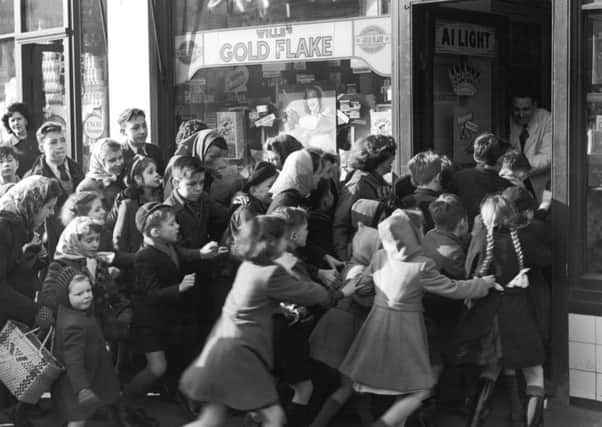On this day: Sugar rationing ends in Britain


4 FEBRUARY
National day of Sri Lanka.
1649: Charles II proclaimed king in Edinburgh.
1716: Prince James Francis Stuart, the Old Pretender, left Scotland.
1874: British forces under Garnet Wolseley burned Kumasi, Ghana, ending Ashanti War.
Advertisement
Hide AdAdvertisement
Hide Ad1899: Filipinos staged revolt against United States because independence was not granted.
1915: Britain announced a naval blockade of Germany.
1922: Japan agreed to restore Shantung to China.
1929: The first area of Green Belt was approved: five miles of land near Hendon, Middlesex.
1938: Adolf Hitler assumed office as Germany’s war minister and named Joachim von Ribbentrop as foreign minister.
1941: The 8,000-ton cargo ship Politician went aground on Eriskay, with a cargo of luxuries, including 250,000 bottles of whisky, bound for New Orleans and Kingston, Jamaica. The wreck was immortalised by Sir Compton Mackenzie in Whisky Galore, later made into an Ealing film comedy.
1945: Yalta Conference involving Churchill, Roosevelt and Stalin began in the Crimea to find a policy among Allies for closing the war and coping with post-war government.
1953: Sweet rationing ended in Britain.
1962: Two Swiss climbers achieved the first winter ascent of the Matterhorn’s north face.
1971: Rolls-Royce declared itself bankrupt, brought down by a contract to design and manufacture the RB211 jet engine for the new Lockheed TriStar which had a hard bargain on price and penalty clauses.
1972: Britain and nine other nations recognised East Pakistan as independent nation of Bangladesh.
Advertisement
Hide AdAdvertisement
Hide Ad1981: The government announced it would sell half the shares in British Aerospace – nationalised in 1977 – as part of Margaret Thatcher’s policy to privatise nationalised industries.
1987: The United States regained the America’s Cup, when yacht Stars and Stripes beat the Australian challenger Kookaburra III off Perth.
1990: Terrorists ambushed bus carrying Israeli tourists in Egypt, killing nine people and wounding 20.
1991: Winnie Mandela went on trial in Johannesburg on eight charges relating to kidnap of four township youths, one of whom was later killed.
1992: A coup d’état is led by Hugo Chávez Frías, against Venezuelan president Carlos Andrés Pérez.
1998: An earthquake measuring 6.1 on the Richter Scale in northeast Afghanistan killed more than 5,000.
2002: Cancer Research UK, the world’s largest independent cancer research charity, was founded.
2003: The Federal Republic of Yugoslavia was officially renamed to “Serbia and Montenegro” and adopted a new constitution.
Advertisement
Hide AdAdvertisement
Hide Ad2004: Facebook, a mainstream online social network, was founded by Mark Zuckerberg.
2008: The London Low Emission Zone (LEZ) scheme began to operate in the UK.
Births: 1881 Fernand Léger, French artist; 1895 Nigel Bruce, actor; 1902 Charles Lindbergh, American aviation pioneer; 1906 Dietrich Bonhoeffer, theologian murdered by Nazis; 1913 Rosa Parks, civil rights activist; 1915 Sir Norman Wisdom OBE, actor and comedian.
Deaths: 1555 John Rogers, Protestant martyr (burned at stake); 1881 Thomas Carlyle, historian; 1983 Karen Carpenter, singer; 1987 Liberace, pianist; 2013 Reg Presley, British singer (The Troggs); 2013 Donald Byrd, American jazz trumpeter.